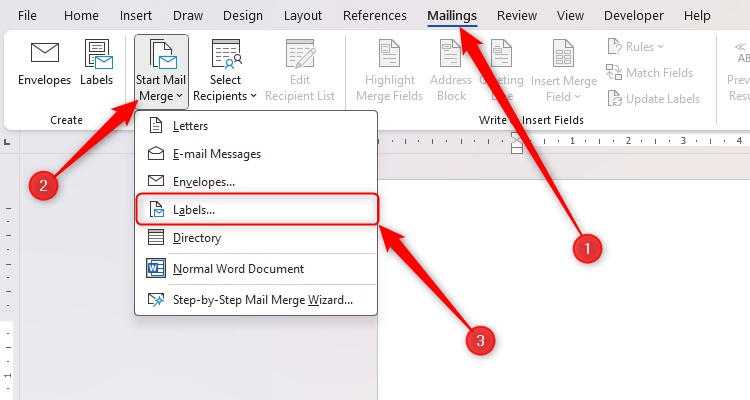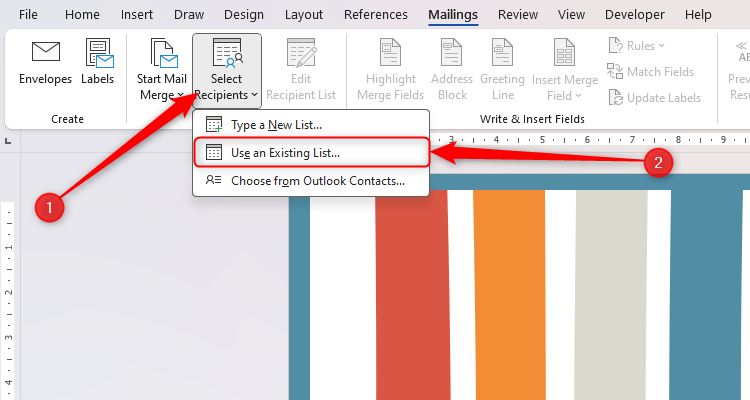Mail Merge Is More Useful Than You Think: 4 Practical Uses
Microsoft Word Mail Merge: Practical Tips for Improved Efficiency
This article will introduce the daily application of Microsoft Word mail merge function, helping you easily handle tasks such as address tags, personalized reports, cover letters and certificates. The mail merge feature allows you to create personalized documents, such as sending personalized emails in batches or creating certificates with personal information. You can create a list of data directly in Word, or import data from programs like Excel. This article will focus on how to use the mail merging feature in combination with Excel. Please note that this feature is currently limited to Microsoft 365 desktop version of Word apps.
1. Make wedding invitations or Christmas greeting card address tags
Writing addresses by hand is time-consuming and labor-intensive and prone to errors. With Word Mail Merge feature, you can easily print address labels or cut and paste them on plain paper.
First, create a name and address list in Excel, with each row of information located in a different column, and the first row is the title. Make sure all cells are filled in, empty cells will affect mail merge.

Save Excel file.
Create a new blank document in Word and click "Mail" > "Start Mail Merge" > "Tag".

Select "30 Tags per Page" to save paper and click "OK".

Enable the "Show/Hide" (¶) option to view the label layout.
Click "Mail"> "Select Recipient"> "Use Existing List", select the Excel file and open it. In the Select Table dialog box, select the "First row contains column titles" check box and click OK.

Click "Insert Merge Domain", select the title in Excel (such as "Name"), press Enter, and then add address information. If the text is out of the label range, you can drag the bottom of the label to resize.

Click "Update Tag" to apply the merge domain.

Click "Preview Results" to check the label effect.

Click "Finish and Merge"> "Print Document" to print the label. To modify a single address, select Edit Single Document.

2. Write a personalized report
This method is suitable for scenarios such as teachers writing student reports.
In a Word document, enter the report subject, use "[name]" instead of the name, and "--" instead of the content that needs to be filled in in person.

In Excel, copy each sentence to the first row and add the "Name" column.

Fill in the content of each report and save the Excel file.
In the Word document, click "Mail" > "Select Recipient" > "Use Existing List", select the Excel file and open it. Select the "First row contains column titles" check box and click "OK".

Select "[Name]" or "--", click "Insert Merge Field" and select the corresponding field.

Click "Preview Results" to view the report, and click "Finish and Merge" to print or edit the report.

3. Write a cover letter
Using the email merge feature, you can quickly create multiple cover letters to highlight different skills.
In Excel, enter the skill category in the first line and enter the corresponding skill description in the second line.

Save Excel file.
In Word, enter the beginning and end of the cover letter. Click "Mail" > "Select Recipient" > "Use Existing List", select the Excel file and open it. Select the "First row contains column titles" check box and click "OK".

Click "Insert Merge Domain" and select the skill description.

Click "Preview Results" to check the cover letter, click "Finish and Merge"> "Edit a Single Document" to modify it.

IV. Design Certificate
Create a list of winner information in Excel and save the file.

Design certificates in Word, you can use templates. Click "Mail" > "Select Recipient" > "Use Existing List", select the Excel file and open it. Select the "First row contains column titles" check box and click "OK".

Click "Insert Merge Domain" to add the information to the certificate.

Click "Preview Results" to check the certificate, click "Finish and Merge"> "Print Document" to print the certificate.

I hope the above information can help you better utilize the Word email merging function and improve your work efficiency!
The above is the detailed content of Mail Merge Is More Useful Than You Think: 4 Practical Uses. For more information, please follow other related articles on the PHP Chinese website!

Hot AI Tools

Undress AI Tool
Undress images for free

Undresser.AI Undress
AI-powered app for creating realistic nude photos

AI Clothes Remover
Online AI tool for removing clothes from photos.

Clothoff.io
AI clothes remover

Video Face Swap
Swap faces in any video effortlessly with our completely free AI face swap tool!

Hot Article

Hot Tools

Notepad++7.3.1
Easy-to-use and free code editor

SublimeText3 Chinese version
Chinese version, very easy to use

Zend Studio 13.0.1
Powerful PHP integrated development environment

Dreamweaver CS6
Visual web development tools

SublimeText3 Mac version
God-level code editing software (SublimeText3)
 how to add page numbers in word
Aug 05, 2025 am 05:51 AM
how to add page numbers in word
Aug 05, 2025 am 05:51 AM
To add page numbers, you need to master several key operations: First, select the page number position and style through the "Insert" menu. If you start from a certain page, you need to insert the "section break" and cancel the "link to the previous section"; second, set the "Home page different" to hide the home page number, check this option in the "Design" tab and manually delete the home page number; third, modify the page number format such as Roman numerals or Arabic numerals, and select and set the starting page number in the "Page Number Format" after sectioning.
 How to add transitions between slides in a PPT?
Aug 11, 2025 pm 03:31 PM
How to add transitions between slides in a PPT?
Aug 11, 2025 pm 03:31 PM
Open the "Switch" tab in PowerPoint to access all switching effects; 2. Select switching effects such as fade in, push, erase, etc. from the library and click Apply to the current slide; 3. You can choose to keep the effect only or click "All Apps" to unify all slides; 4. Adjust the direction through "Effect Options", set the speed of "Duration", and add sound effects to fine control; 5. Click "Preview" to view the actual effect; it is recommended to keep the switching effect concise and consistent, avoid distraction, and ensure that it enhances rather than weakens information communication, and ultimately achieve a smooth transition between slides.
 Complete guide to collaborate in Word and Real Time Co -authorship
Aug 17, 2025 am 01:24 AM
Complete guide to collaborate in Word and Real Time Co -authorship
Aug 17, 2025 am 01:24 AM
Microsoft Word CollolaBate: How to work with co -authors in Word, edit in real time and manage versions easily.
 How to customize the tapes in Office step by step
Aug 22, 2025 am 06:00 AM
How to customize the tapes in Office step by step
Aug 22, 2025 am 06:00 AM
Learn to customize the tapes in Office: Change names, hide chips and create your own commands.
 How AI Will Give Superpowers To ERP Solutions
Aug 29, 2025 am 07:27 AM
How AI Will Give Superpowers To ERP Solutions
Aug 29, 2025 am 07:27 AM
Artificial intelligence holds the key to transforming ERP (Enterprise Resource Planning) systems into next-generation powerhouses—equipping organizations with what can only be described as digital superpowers. This shift isn't just a minor upgrade; i
 How to use free Word: all the advantages of the Office online version
Aug 14, 2025 pm 02:30 PM
How to use free Word: all the advantages of the Office online version
Aug 14, 2025 pm 02:30 PM
Do you want to use free Word? Discover here all the advantages that the Microsoft Office online version can offer you for your team.
 Get a list of unique values in Excel & extract unique rows
Aug 18, 2025 am 07:39 AM
Get a list of unique values in Excel & extract unique rows
Aug 18, 2025 am 07:39 AM
This is the concluding segment of the Excel Unique Values series, detailing how to retrieve distinct or unique values from a column using formulas, along with customization tips for various data types. You'll also discover how to swiftly generate a d
 How to create a table with a repeating header row in Word
Aug 08, 2025 am 04:41 AM
How to create a table with a repeating header row in Word
Aug 08, 2025 am 04:41 AM
Ensurethefirstrowofyourtablecontainscolumnheaderslike"Name"or"Date"andmaintainspropertablestructurewithoutmergedcells.2.Clickanywhereinthefirstroworselectitentirelybyclickingitsleftedge.3.GototheTableDesigntab(Windows)orTabletab(M







